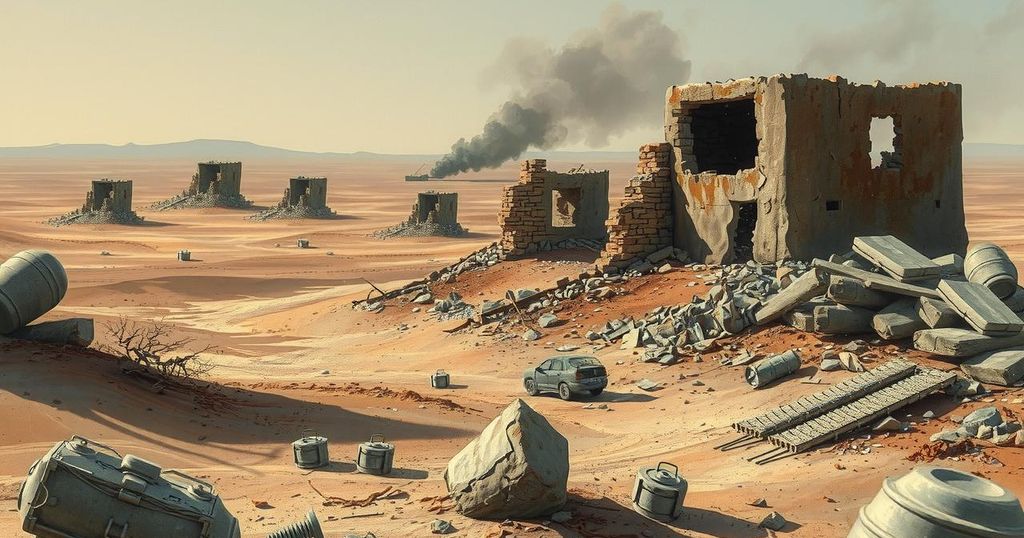Sudan’s civil conflict has led to a humanitarian crisis affecting 30 million people. Following the military coup in 2021, the situation has worsened with escalating violence under the RSF and SAF. Despite international interventions, the conflict and humanitarian needs persist as the quest for democracy seems increasingly unattainable.
As Sudan’s civil conflict approaches its two-year anniversary, the humanitarian situation has reached alarming levels. 30 million individuals require urgent assistance, while 9 million have been forcibly displaced and another 3 million have fled to neighboring countries. The United Nations has described the crisis as one marked by a “staggering scale and brutality.”
The unrest began following the 2018-2019 demonstrations that ousted Sudan’s autocratic leader, Omar al-Bashir, and aimed to establish a democratic government through a civilian-military partnership known as the Sovereignty Council. However, this progress was abruptly halted in October 2021 when the military seized control, appointing General Abdel Fattah al-Burhan as the head of the council, with Lt. General Mohamed Hamdan Dagalo, leader of the Rapid Support Forces (RSF), as his deputy.
The RSF, which evolved from the notorious Janjaweed militants with a reputation for brutality in Darfur, has significantly expanded its fighting force. From a modest 5,000 members in 2014, the RSF had grown to 100,000 fighters by early 2023. Attempts to revive the civilian rule faltered, and Sudan has remained under military governance since January 2022, led by the two generals.
Throughout 2022, efforts spearheaded by the United States and Saudi Arabia attempted to restore the civilian-military alliance but failed to materialize into lasting change. The subsequent Political Framework Agreement of December 2022 sought to restore civilian authority and merge the SAF with the RSF; however, the expectation that military leaders would concede power proved impractical.
The conflict escalated markedly on April 15, 2023, as the RSF launched extensive military offensives across Sudan, rapidly gaining control of critical regions, including Darfur and Khartoum. By the end of 2023, approximately half the country had fallen into RSF control, leading to severe humanitarian crises characterized by famine and dislocation, compounded by violence against civilians.
By June 2024, casualties had reportedly exceeded 150,000, with 12 million people displaced, amplifying the severity of food shortages, particularly following the RSF’s capture of agricultural hubs. Furthermore, accusations emerged that the RSF intentionally destroyed food reserves to drive a man-made famine.
The dynamic of power began to shift by 2024, as internal challenges emerged within the RSF, which suffered from strategic miscalculations and dwindling supplies. Conversely, the SAF, bolstered by recruitment and new strategic alliances, began reclaiming territories, including critical infrastructure in Khartoum and other provinces.
Foreign involvement has also played a pivotal role in the Sudanese conflict, with support for combatants emerging from nations such as the UAE, Türkiye, and Russia. The UAE, an essential player, has provided material support to the RSF while seeking to establish its political influence and economic interests in Sudan’s agricultural sector.
In response, the SAF has garnered support from Iran and Russia, establishing alliances that underscore the international dimensions of the conflict. Additionally, as Western interest diminishes due to other global crises, the United States has undertaken limited measures, such as sanctions against individuals within both warring factions, yet these actions have had little impact on the escalating violence.
Today, the conflict continues to produce significant losses for the civilian population, with expectations of a return to a technocratic government led by military figures reminiscent of previous leadership structures. The divisions among democracy activists reflect a challenging path ahead for re-establishing governance and providing humanitarian assistance, emphasizing the plight of Sudan amidst an ongoing struggle for power.
In summary, Sudan remains in a state of crisis as it grapples with civil conflict, severe humanitarian issues, and foreign interventions. The transition toward democracy has stagnated following military coups, leading to widespread violence and suffering among civilians. Despite attempts at negotiations and foreign engagement, the conflict persists, underscoring the complexities of both local and international dynamics at play. The future of Sudan remains uncertain, with significant humanitarian needs that require urgent attention and resolution.
Original Source: frontline.thehindu.com






